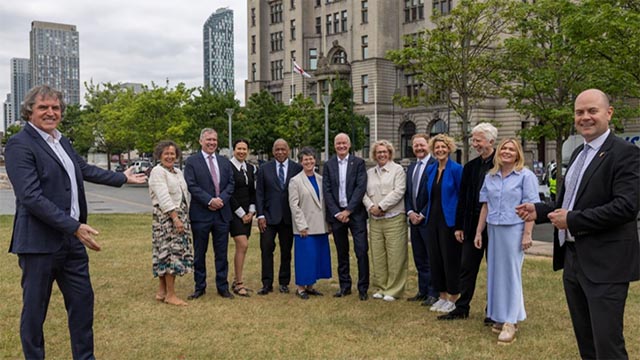From the collapse of Comet and the MWB Group, to the richer pickings offered by bargain store chain B&M and upmarket housebuilder Cala, private equity continues to eye the property assets of UK plc.
Writing in Estates Gazette last week, Jones Lang LaSalle UK chairman Richard Batten predicted private equity groups would “continue to harvest distressed stock”.
This week, Deloitte laid bare just how influential the sector has grown. “Private equity vehicles invested the greatest amount of buyer groups in 2011, accounting for £1.6bn of direct real estate portfolios,” the firm said.
“In 2012, this activity is expected to exceed last year’s levels, with £1.8bn either currently under offer or transacted so far. By including loan portfolio transactions in both years, private equity contribution would be significantly higher compared to any other buyer group.”
Despite the increased activity, private equity – deserved or otherwise – still has a reputation for conducting its affairs out of the public gaze. That, in the property sector at least, is set to change.
Significant change
Next summer, David Marks takes over from British Land chief executive Chris Grigg as president of the British Property Federation. If it feels significant, that’s because it is.
The handing of the baton from a traditional propco – albeit one now wearing the youthful cloak of a REIT – to a seven-year-old private equity house marks a changing of the guard at the top of the industry.
Speaking to him on stage earlier this month at the latest EG/Profile Network Face to Face event, it is clear why the Brockton Capital co-founder wants to raise his profile.
“To be honest,” he says, “deal flow. The property market is fundamentally different from the stock market and the bond market. Assets are particular, individual, and if you miss an individual asset there is no point in buying next door, because it might be a completely different asset, building or investment proposition.”
He picks an iconic north London trophy – which cost him up to £40m earlier this year – to hammer home his point.
“There is only one Camden Market, as an example, so you have to have a certain level of profile in order to receive phone calls and be given the opportunity to sometimes buy things outright and sometimes partner with people. If you are not in the forefront of people’s minds you can miss things.
“The worst thing, I think, from our perspective, would be to bump into someone in the street and have them say, ‘I just sold Camden Market. You would have done that, wouldn’t you?’
“You have to have enough profile or PR so that people are constantly calling you with ideas, because there’s no point in buying Wembley Market if you missed Camden Market.”
Marks disagrees that private equity remains secretive: “I think that was true, certainly 15 years ago, probably 10 years ago. But in the last five years it has completely changed.
“Blackstone is a much larger example of a private equity firm. They own Hilton, worldwide. They are in CentreParcs, they are in Broadgate, Chiswick Park, they’ve built up Nido. You cannot be secretive with those kind of assets, develop those kind of assets and run those kind of businesses.
“Private equity has grown up a lot in the last few years on both sides of the Atlantic and is much more engaged with everyone – the public, the media, the regulators, stakeholders in the widest context.”
Following his own path
Marks’ path to private equity began when he decided not to follow his father into the City. Just as Michael Marks spent the 1990s cementing his position as one of London’s best-known bankers – he was Merrill Lynch’s first executive vice-president outside the US – David was rising through the ranks at Jones Lang LaSalle.
In a 10-year career with the firm, it was the 12 months he spent in the US that changed his outlook. “I remember the overwhelming feeling I had when I was there was that I thought I knew about property,” he says. “I realised after a year in New York, or even after a week in New York, that actually I knew a tiny fraction of what there was to know.
“This was the mid-90s and they were talking about things like IRRs, REITs and CMBS, and none of that talk or language existed in mid-90s UK property.”
He enrolled at MIT to study for a master’s in real estate. It was not long after he returned to corporate life that he decided his future lay in private equity. “Blackstone’s London office had just opened, so there were 15 people on the real estate side, managing a lot of money and doing very interesting transactions,” he says. “It was like business school every day.”
He spent five years with the house but in the end could not resist the urge to go it alone. At MIT he had met Jason Blank, who was working at Merrill in Hong Kong and Tokyo. Marks persuaded Blank to move to London and in 2005 Brockton was born. “It was kind of friendly, and people wished us the best,” he says. “And we had no idea whether we’d raise any money, but we had the buzz of just trying to start something and do something for yourself.
“We were very lucky and ended up raising about £100m within six weeks from people that we knew, who liked us and thought we would be sensible.”
They spent much of the next two years writing to investors explaining why they were not doing anything with the money.
The market was “insane”, says Marks. That changed, of course, and “stood us in good stead as well, because when we invested the second half of the fund post-Lehman, things felt like they were more sensible”.
Potential growth
In seven years Brockton has raised £650m investing in asset-backed, property-related securities, from high-end residential to retail parks, urban markets and pubs.
He is excited about Camden Lock Market – it could grow through a potential acquisition of the Camden Stables Market – and it is a model he would like to roll out elsewhere in London and beyond. He continues to talk options with Structadene’s David Pearl, though the formal deal between the two unravelled. And high-end residential in London remains attractive. “We feel quite good about just the fundamental supply and demand,” he says, in an overly measured tone.
Is there a secret? Marks says: “There’s an unofficial rule in the firm, which is when we are looking at an asset, and again it does not matter what it is – it can be a retail park in Rotherham, it can be Camden Market, it can be a residential development in London – everyone understands that it is pointless to talk about debt or level of return for weeks and weeks.
“When you start looking at something you have just got to think that you are buying it on an all-equity basis and what can you do with that asset? What can you make it worth? Who are you going to sell it to?
“What kind of person or group are you going to sell it to at the end, when you’ve fixed it up?”
damian.wild@estatesgazette.com











